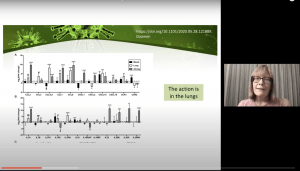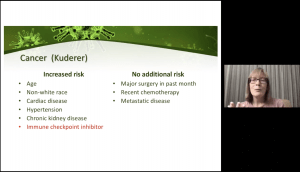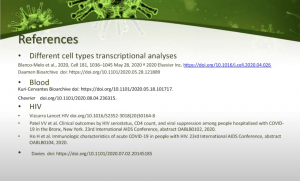In this Webinar, Kathleen Sullivan discusses how COVID-19 impacts immunodeficient patients.
She began her talk emphasising that majority of COVID-19 research has focused on pathogenesis, however, very limited knowledge is available on the intersections between COVID-19 and immunodeficiency. For more information on the different arms of immunity associated with COVID-19 immunity and pathology, read the articles below.
- Is there a role of T cells in immune protection to SARS-CoV-2 infection and COVID-19?
- Cytokine Release Syndrome & COVID-19
- The current status of COVID-19 immunology
- SAIS/Immunopaedia Webinar: Antibody responses and serology testing
- The “topology” of the immune response to COVID-19
- Other COVID-19 associated articles
She also cautioned on the inference of COVID-19 pathogenicity using systemic immune profiling or understanding immunity to COVID-19 and presented data the illustrated discrepancies in chemokine and cytokines expression levels between blood and lung samples.
Majority of immuno-ageing studies have focused on the reduced activity of adaptive immunity in elderly individuals which contributes to increased susceptibility to viral infections. In line with this data, ageing is one of the highest risk factors of COVID-19 severity. Kathleen also described that myeloid dysfunction is also associated with ageing. Further, she described data that showed that co-morbidities listed below were not associated with increased risk of severe COVID-19.
- HIV (low T cell count): Though the majority of studies show no increased risk, a study conducted in South Africa contradicts.
- Cancer: Studies suggested that progressive cancer disease seems to be a risk factor for COVID-19.
- Treatment with nonsteroidal anti-inflammatory drugs (NSAIDs) and/or inflammatory cytokine blockersg anti-IL-17, IL-23 or IL-12/23
- Inborn errors of immunity g Antibody deficiency
Summary by Cheleka Mpande













